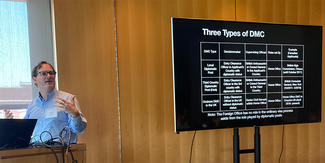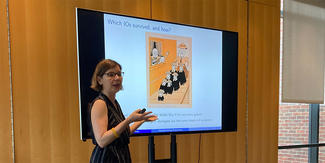Niehaus Workshop Examines the Role of Diplomats and Bureaucrats in International Relations

Much of the work of interstate relations is ultimately carried out by bureaucrats. Individual officers within diplomatic, military, and intelligence bureaucracies, trade and investment agencies, and international organizations play vital roles in global commerce, cooperation, and governance. Yet, despite their ubiquity in the conduct of international politics, foreign policy bureaucrats have only recently become a major focus of international relations scholarship.
Last month, SPIA’s Niehaus Center for Globalization and Governance welcomed several dozen scholars to Wallace Hall for a two-day workshop exploring bureaucratic agents and institutions. “Diplomats and Bureaucrats in International Relations” featured innovative methods and new data to study diplomats and other foreign policy bureaucrats, facilitate discussion and collaboration, catalyze the coherence of an emerging field of study, and discuss new research questions.

Among the questions the scholars sought to address were:
- How and when are foreign policy bureaucrats able to exert independent influence over political outcomes?
- What pathologies — perhaps generated by the incentive for career advancement — exist within these bureaucracies, and what are their consequences?
- How does the institutional design of foreign policy bureaucracies influence a state’s foreign relations?
The papers presented focused on individual agents operating at different levels of the foreign policy process, from top-level advisors and heads of international organizations to ambassadors, other mid-level officials, and street-level bureaucrats. Common themes included individual influence in the foreign policy process, the mechanisms of diplomatic communication, the implications of representation and diversity in the foreign policy bureaucracy, and how organizational interests shape individual preferences.
Many papers presented analyses of novel data from archival and firsthand sources: transcripts from presidential advisory meetings, diplomatic cable traffic, State Department press guidances, records of diplomatic gifts, personnel directories of foreign missions, newly collected biographical data on ambassadors, and data on visa issuance.

The workshop concluded with an expert roundtable featuring three distinguished scholars of diplomacy and bureaucracy in international relations: Julia Gray, of the University of Pennsylvania; Brian Rathbun, of the University of Southern California; and Elizabeth Saunders, of the Georgetown School of Foreign Service. The trio spoke about their experiences as pioneers of the research agenda and offered prescriptions (and proscriptions) for the future, encouraging attendees to be open to a wide variety of research methods and to acquire a deep understanding of the processes that generate the memos and cables that we use as data. Panelists also fielded questions from the audience regarding, among other topics, the concept of political agency and how we might bridge the gap between academia and the policy world.
The workshop was organized by Niehaus Fellows Matt Malis and Calvin Thrall.
